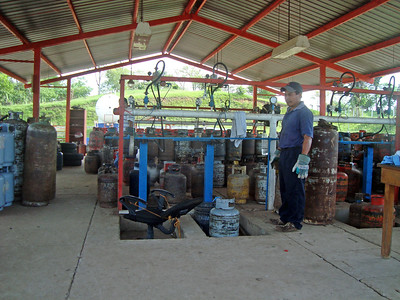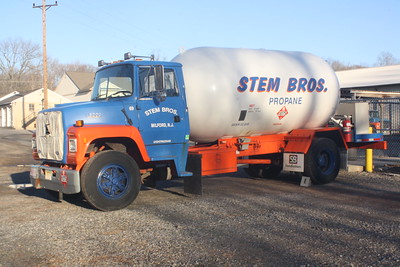
When it comes to propane suffocation, it’s important to know the risks. Propane is a gas that is heavier than air, so it can settle in low-lying areas and create an oxygen-deficient environment. This can lead to asphyxiation, which is why it’s so important to be aware of the dangers of propane suffocation. If you suspect that you or someone else may be suffering from propane suffocation.
When propane is released into an enclosed space, it can quickly displace the oxygen, creating an oxygen-deficient environment. Inhaling air that is low in oxygen can cause symptoms such as dizziness, headaches, and nausea. In severe cases, it can lead to unconsciousness and even death.
Propane gas leaks are one of the most common causes of oxygen deficiency in homes and other buildings. If a propane tank or appliance is not properly maintained or installed, it can develop a leak, allowing gas to escape into the air. The smell of propane is often used as a warning sign of a gas leak, but it is not always present. Some people may be unable to smell propane due to a condition called anosmia, or a lack of the ability to smell.
To prevent the risk of suffocation from propane, it is important to follow safety guidelines when using and storing the gas. All propane tanks and appliances should be regularly inspected and maintained by a qualified professional. It is also important to install and use propane appliances according to the manufacturer’s instructions and local codes. If you smell propane or suspect a gas leak, it is important to evacuate the area immediately and call for help.
Symptoms of that you are suffocating
Symptoms of propane suffocation can include dizziness, headaches, and nausea. These symptoms can occur when inhaling air that is low in oxygen, which can happen if propane is released into an enclosed space. In severe cases, propane suffocation can lead to unconsciousness and even death.
Propane gas leaks are one of the most common causes of oxygen deficiency in homes and other buildings. If a propane tank or appliance is not properly maintained or installed, it can develop a leak, allowing gas to escape into the air. The smell of propane is often used as a warning sign of a gas leak, but it is not always present. Some people may be unable to smell propane due to a condition called anosmia, or a lack of the ability to smell.
To prevent the risk of suffocation from propane, it is important to follow safety guidelines when using and storing the gas. All propane tanks and appliances should be regularly inspected and maintained by a qualified professional. It is also important to install and use propane appliances according to the manufacturer’s instructions and local codes. If you smell propane or suspect a gas leak, it is important to evacuate the area immediately and call for help.
If you experience any of the symptoms of propane suffocation, it is important to seek medical attention as soon as possible. Oxygen therapy can help to restore the oxygen levels in your blood and prevent further complications. In severe cases, hospitalization may be necessary to provide oxygen and other supportive care.
What to do in case of propane suffocation
If you suspect that you or someone else is experiencing propane suffocation, it is important to take immediate action to evacuate the area and seek medical attention.
The first step is to evacuate the area where the propane is present. If you are indoors, open windows and doors to allow fresh air to enter the space and disperse the propane. If you are outdoors, move away from the area where the propane is present and into a well-ventilated area.
Next, call for help. If you smell propane or suspect a gas leak, contact the gas company or a qualified professional to repair the leak and make the area safe. If you or someone else is experiencing symptoms of suffocation, such as dizziness, headache, or nausea, call 911 or your local emergency services number for medical assistance.
Once you are in a safe location, it is important to monitor the person who may be experiencing propane suffocation for signs of distress. If they are unconscious or not breathing, begin CPR immediately and continue until help arrives. If they are conscious, keep them calm and comfortable, and provide oxygen if possible.
In summary, if you suspect that you or someone else is experiencing propane suffocation, the steps to take are:
- Evacuate the area where the propane is present.
- Call for help.
- Monitor the person who may be experiencing propane suffocation and provide first aid as needed.
By following these steps, you can help prevent further complications and ensure that the person receives the medical attention they need.
First aid for propane suffocation
If you suspect that someone is experiencing propane suffocation, it is important to provide first aid as needed until medical help arrives. The specific steps to take will depend on the person’s condition and symptoms.
If the person is unconscious or not breathing, begin CPR immediately. CPR involves compressing the person’s chest to circulate blood and oxygen to their brain and other vital organs. It should be performed by a trained and certified individual, and continued until medical help arrives.
If the person is conscious and breathing, keep them calm and comfortable, and provide oxygen if possible. Oxygen therapy can help to restore the oxygen levels in their blood and prevent further complications. If the person is experiencing symptoms such as dizziness, headache, or nausea, provide first aid for these symptoms as needed.
It is important to note that providing first aid for propane suffocation is only a temporary measure until medical help arrives. The person should be transported to a hospital or other medical facility as soon as possible for further treatment and monitoring.
In summary, the first aid steps for propane suffocation are:
- If the person is unconscious or not breathing, begin CPR immediately.
- If the person is conscious and breathing, keep them calm and comfortable, and provide oxygen if possible.
- Provide first aid for any additional symptoms as needed.
- Transport the person to a hospital or other medical facility as soon as possible.
By following these steps, you can help prevent further complications and ensure that the person receives the medical attention they need.
What happen if you inhale propane and at what level it is dangerous when inhaled
When propane is inhaled, it mixes with the oxygen in the air and is absorbed into the bloodstream. This can cause a number of symptoms, depending on the concentration of the gas and the length of time it is inhaled.
At low concentrations, propane can cause dizziness, headaches, and nausea. These symptoms typically occur within a few minutes of inhaling the gas and may last for several hours. In most cases, these symptoms are temporary and will resolve on their own.
At higher concentrations, propane can cause more severe symptoms, such as loss of coordination, drowsiness, and unconsciousness. Inhaling high concentrations of propane for a long period of time can also cause asphyxiation, or a lack of oxygen in the body. This can lead to permanent brain damage or death.
The level at which propane becomes dangerous to inhale depends on a number of factors, including the concentration of the gas and the person’s age, weight, and health status. In general, inhaling propane at concentrations of more than 2,100 parts per million (ppm) can be dangerous. However, even lower concentrations of propane can be harmful if inhaled for a long period of time.
To prevent the risk of inhaling propane, it is important to follow safety guidelines when using and storing the gas. Propane tanks and appliances should be regularly inspected and maintained by a qualified professional, and they should be used according to the manufacturer’s instructions and local codes. If you smell propane or suspect a gas leak, it is important to evacuate the area immediately and call for help.
PPM amount for propane to be toxic
At air concentrations below 1000 ppm propane is non-toxic. Short period exposures to the gas at 10,000 ppm cause no side effects; 100,000 ppm can cause slight dizziness and mild nausea after a short period of exposure, but even in short period, one can cause nose or throat irritation and coughing.
The specific level at which propane becomes toxic depends on a number of factors, including the concentration of the gas and the person’s age, weight, and health status.
Propane is measured in parts per million (ppm), which is a unit of concentration that indicates the number of propane molecules in a given volume of air. In general, inhaling propane at concentrations of more than 1,000 ppm for more than 60 minutes can be dangerous. However, even lower concentrations of propane can be harmful if inhaled for a long period of time.
The effects of inhaling propane at different ppm levels can vary depending on the person’s age, weight, and health status. For example, a healthy adult may be able to tolerate higher concentrations of propane than a young child or an older person. In addition, certain medical conditions, such as asthma or chronic obstructive pulmonary disease (COPD), can make a person more sensitive to the effects of propane.
To prevent the risk of inhaling propane, it is important to follow safety guidelines when using and storing the gas. Propane tanks and appliances should be regularly inspected and maintained by a qualified professional, and they should be used according to the manufacturer’s instructions and local codes. If you smell propane or suspect a gas leak, it is important to evacuate the area immediately and call for help.
To make a conclusion
If you or someone you know has been exposed to propane, it is important to seek medical attention immediately. Propane is a gas that can cause suffocation and death if inhaled in large enough quantities.
Inhalation of propane can lead to asphyxiation and death. Propane is an invisible gas with a very strong odor. When inhaled, it displaces oxygen in the lungs and prevents the body from breathing. Even if inhaled in small amounts, propane can cause dizziness, drowsiness, and nausea. In large amounts, it can lead to unconsciousness and death.
Propane is often used as a fuel for grills and other outdoor cooking appliances. It is also used as a fuel for many industrial applications such as forklifts and other vehicles. Propane tanks are usually stored outdoors in open areas away from buildings. However, if a tank leaks, the gas can quickly build up in enclosed spaces and become dangerous this what is the usual cause of accumulation of this gas in the air that can lead to inhalation and suffocation..
If you suspect that someone has inhaled propane, call 911 immediately and have them move to fresh air. If they are not breathing, begin CPR and continue until medical help arrives.

Mike is an experienced propane technician with over 15 years of professional experience in the field. He has dedicated his career to helping customers with their propane needs, from installation to maintenance and repair. Together with Jeremy, he co-founded this website to provide useful information and guidance to customers seeking reliable propane services.




